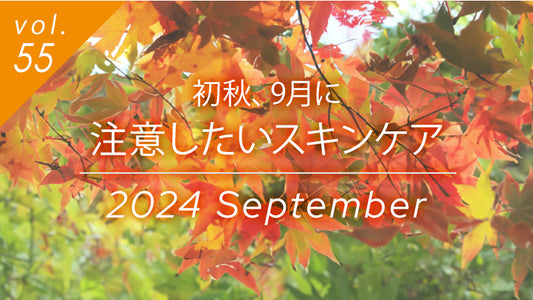
The Japan Meteorological Agency announced that this year's rainy season is about two weeks later than usual, and is likely to have started on June 21 in the Kinki, Tokai, and Kanto-Koshin regions. Since the rainy season started late, it does not seem to be ending late either, and the latest forecast from the Japan Meteorological Agency predicts that the rainy season will end in various areas around mid-July.
This time, we will be bringing you skin care tips for the rainy season and after it ends, when summer really begins.
Skin care keywords for the rainy season, the end of the rainy season, and the start of summer
When we think of the rainy season, we think of high humidity and humid days. In addition, during the sunny days between the rainy season and after the rainy season ends, we are hit by strong sunlight and heat. There are three skin care keywords to keep in mind during this hot and humid season.

1. Sweating and sebum secretion <br data-mce-fragment="1">This is the hot and humid season, which means it's the season for sweating. In addition, sebum secretion also increases during this time, so measures against sweating and sebum production are required.
2. Photoaging caused by UV rays <br data-mce-fragment="1">UV rays, especially UVA rays, are a cause of photoaging such as wrinkles and sagging skin. UVA rays are troublesome because they can penetrate clouds and glass. The summer solstice is the longest daylight hour and naturally the highest level of UV exposure, so UV protection measures are essential to prevent photoaging.
3. Dryness, poor circulation, and poor metabolism caused by air conditioning<br data-mce-fragment="1">Air conditioning is essential during this hot and humid season. The cooling and dehumidification of air conditioners makes the air dry. In addition, the temperature difference with the outside air becomes large, which causes stress and leads to poor circulation and poor metabolism. In addition to taking measures against dryness caused by air conditioning, it is necessary to devise ways to alleviate the temperature difference by wearing jackets in an air-conditioned environment, etc.
"Eel" and "pickled plums" to prevent summer fatigue
In Japan, there is a dietary custom that it is good to eat eel on Doyo no Ushi no Hi. Doyo refers to the 18-day period immediately before the beginning of spring, summer, autumn, and winter, and the day that coincides with the 12-day cycle of the Chinese zodiac sign "Ox" is called Doyo no Ushi no Hi. By the way, Doyo no Ushi no Hi in 2024 will occur six times a year, with the summer days being July 24th (Wed) and August 5th (Mon). It has long been said that it is good to eat foods that start with the letter "u" on Doyo no Ushi no Hi, such as eel, pickled plums, and udon noodles. On the other hand, there is a legend that eel and pickled plums are not good to eat together, but there is no scientific basis for this, and both eel and pickled plums are good ingredients for preventing summer fatigue.
The benefits of eel <br data-mce-fragment="1">Eel is rich in vitamins A, B1, B2, and D, as well as calcium, iron, zinc, lipids (DHA, EPA), collagen, and more, making it an ideal food for nourishing and strengthening the body and preventing summer fatigue.
The vitamin A contained in particular is said to be good for the eyes, and is also expected to increase resistance and relieve fatigue.

Umeboshi effect <br data-mce-fragment="1">Citric acid, the source of the sourness of umeboshi, has the effect of expelling lactic acid, which causes fatigue, and is expected to have a fatigue recovery effect.
In addition, adding umeboshi to your lunchbox can help prevent the growth of Staphylococcus aureus, which causes food poisoning. It has also been reported that umeboshi have a protective effect on the stomach mucosa and help with dieting.

Sebum countermeasures to prevent summer skin problems
Sebum secretion increases during the summer season from June to August, making it necessary to take measures against sebum. Deepening your understanding of sebum itself and taking appropriate measures against sebum will help prevent summer skin problems.

What is Sebum?
The sebaceous glands, which are organs in the dermis layer that secrete sebum, open into the pores, and the sebum spreads through the pores to the surface of the epidermis, forming a sebum film. The sebum film fulfills the following roles:
① Barrier function: It acts as a barrier to protect the skin from direct contact or penetration by foreign substances.
② Antibacterial function Sebum has a weak acidity of pH 4.5 to 6.0, which inhibits the proliferation of bacteria normally present on the skin surface.
③ Moisturizing function The skin membrane prevents water from evaporating from the skin, and as a result, keeps the skin moist. Due to these functions, sebum is called "natural cream that is produced by the skin itself."
Factors that affect sebum secretion <br data-mce-fragment="1">The amount of sebum secreted varies depending on various factors.
① As seasonal temperatures rise, sebum secretion increases, reaching its peak in the summer. It correlates with sweating and can be thought of as a defense reaction that prevents water loss and keeps the skin moisturized.
② Age: Sebum secretion peaks from adolescence to your 20s, and then tends to gradually decrease as you get older.
③ Gender differences: The amount of male hormone affects the amount of sebum secreted, and men tend to have more. There are also individual differences, and factors such as poor lifestyle habits, metabolic disorders due to stress, and poor dietary habits also affect fluctuations in sebum secretion. The scalp tends to have the most sebum secretion, followed by the T-zone, such as the forehead and nose.
The Importance of Sebum Balance <br data-mce-fragment="1">Either an excess or deficiency of sebum can lead to skin problems, so measures to control the balance are necessary.
Summer is the season for sweating, and the sweat glands and pores open up. Dirt and makeup in the air mix with sebum, causing blockages in the sweat glands and pores. This sebum dirt causes bacteria and acne bacteria to grow, leading to acne, breakouts, and rough skin.
On the other hand, excessive face washing can wash away more sebum than necessary, resulting in a lack of sebum, which can weaken the skin's barrier and moisturizing functions, leaving the skin in a weak state that can lead to skin problems.
A beauty lifestyle that helps you deal with sebum : Get into the habit of gently wiping away sweat and sebum, cleanse, and choose mild facial cleansing products to wash away gently.
・If you feel dryness, we recommend using beauty oil products to replenish oil and using skin care products that focus on moisturizing.
We've shared some skin care tips for the rainy season and after it ends, as summer approaches!
The next theme will be "Beauty tips to soothe your summer skin."



